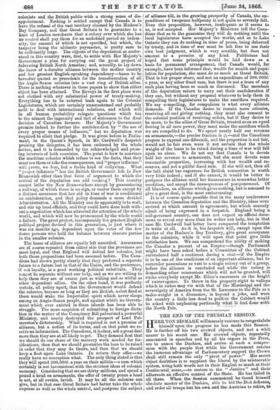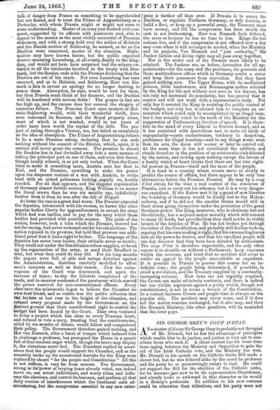THE END OP -THE 'PRUSSIAN SESSION.
HE RR VON BISMARX willicareely venture to congratulate himself upon the progress he has made this Session. He is further off his two avowed objects, and not a whit nearer to his secret one. His avowed objects, repeatedly announced in speeches and by all his organs in the Press, are to annex the Duchies, and arrive at such a compro- mise with the people that while his Government retains the immense advantage of Parliamentary support the Crown shall still remain the only " pivot of power." His secret object doubtless is to supplant the liberal by the aristocratic system, using both words not in their English so much as their Continental; sense,—to restore to the " Junkers " and their adherents an effective control of the State. He has failed in all three. When the Session commenced he found himself absolute master of the Duchies, able to bid the Diet defiance, and order all troops but his own and the Austrian to retire, to talk of danger from France as something to be apprehended but not feared, end to treat the Prince of Augustenburg as a Pretender, with whom Prussia might or might not come to some understanding. Master of an army just flushed with con- quest, supported by its officers with passionate zeal, able to ' appeal to the masses as the most visibly successful of Prussian statesmen, and with a strong hold over the nobles of Holstein and, the Danish section of Schleswig, he seemed, as far as the Duchies were concerned, master of the situation. Diplo- Magas may have known better, but the public expected decrees annexing Lauenburg, at all events, finally to the king- dem,,encl would wip have been surprised had the seizure ex- tinded to all the territories involved in the treaty with Den- mark, but the Session ends with the Premier declaring that the Duchies are out of his reach. Not even Lauenburg has been annexed, and, as to Holstein and Schleswig, Herr von Bis- mark ivfain to invent an apology for no longer desiring to annex them. Absorption, he says, would be best for them, but then Prussia must think of her finances, and the Duchies will be.burdened with serious debts ! The grapes in fact are too.high up, and the excuse does but conceal the chagrin of conscious failure. The Prussian Court once masters of Hol- stein-Schleswig would, with their wonderful thrift, have soon redeemed its finances, and the Royal property alone, moat of which is not wanted, would in ten years of order have been worth the capital of the debt. The pro- ject of ruling through a Viceroy, too, has failed as completely as the idea of absorption. The Prince of Augustenburg refuses to be a mere Prussian satrap, declaring that he can cede nothing without the consent of the Estates, which, again, it is certain will never grant the consent. The promise to absorb the Duchies has in fact dwindled away into a mere menace of taking the principal port in one of them, and even this threat, though loudly uttered, is as yet only verbal. When the Court tried to make it something more, Austria sent her fleet to Kiel, and the Premier, unwilling to stake his power upon the desperate venture of a war with Austria, to strike hard with an armed policeman looking 4.,agerly on, hastily receded. For all that appears, and the singular organization of Germany almost forbids secrecy, King William is no nearer the Ducal crown than he was six months ago, iude.anitely further from it than he was after the fall of DiippeI. At home the case is a great deal worse. The Premier expected the deputies, intoxicated with his success, to barter like other pepular.hedies liberty for aggrandizement, to accept the army which had won battles, and to pay for the navy which those. battles had provided with possible seamen. The pride of the nation, however, took a turn which the Premier, shrewd but not far-seeing, had never reckoned amidst his calculations. The nation rejoiced in its prowess, but held that prowess one addi- tional proof that it .had a right to be free. The language of the deputies, has never been bolder, their attitude never so hostile. Tiles could not under the Constitntion refuse supplies, or break up the, vgan iz a ti. on of the army, or send their trafford to trial, but what they could do they did. For six long months the papers were full of able and savage diatribes against the Administration, diatribes carefully modelled to affect men's interests as well as their reason. Now the extra- vagance of the Court was denounced, and again the increase of taxes; to-day the Liberals complained of the roads, and to-morrow condemned the parsimony which starie(t the ...prizes reserved -for non-commissioned officers. Every elasg tave'the aristocratic began to believe the Chamber its elvn-begt friend., and so visible was the public adhesion that Wit laid4sa at last rose to the height of the situation, and reused every proposal made by the Government ,en: the distinct ground that their constitutional right to eontrol the budget had been denied by the Court. They even ventured to delay a project which lies close to every Prussian heart, and refused to vote a navy, trusting that the constituencies, aided by six months of debate, would follow and-comprehend their policy. The Government therefore gained nothing, and Her von Bismark, after a burst of temper which induced him to challenge a professor, has prorogued the House in a epee& full of that insolent anger which, though the brave may display it, the victorious never feel. The President replied by assur- ances that the people would support the Chamber, and as the assembly broke up the accustomed hurrahs for the King-were replaced by cheers " for the people and Constitution." All this is not arebess, is very far from success. The Government, strong inlitetioiVer of levying taxes already voted, can indeed move on, can arrest individuals, and worry cities, and influ- ence the elections, and control its bureaux, and performall that daily routine. of interferences which the Continent calls ad- :,zniniatering,.but the compromise essential to any new enter- prise is further off than ever. If Prussia is to annex the Duchies, or regulate Northern Germany, or defy Austria, or build a fleet, or keep up a powerful army, the Treasury must have money, and till the compromise has been struck the cash is not forthcoming. Herr von Bismark feels fettered, the more so because he has no time to lose. Kings die but nations live, and if the compromise is not effected now a day may come when it will no longer be needed, when the Ministry and its projects, Von Bismark and " just authority," the Junker faction and divine right may all pass away together. Nor is the secret end of the Premier more likely to be attained. The Junkers are, as before, favourites for all ap- pointments—for the army and the provinces, for generals and those multitudinous offices which in Germany confer a status and keep their possessors from starvation. But they have gained nothing new. The Upper House, with its mediatized princes, little landowners, and Brummagem nobles selected by the King for life and without root save in his favour, has not only not increased its popularity, but has proved that it cannot and will not work with a representative body, Not only has it assisted the King in resisting the public control of the budget, not only has it advised him to complete an an- nexation which could only be accomplished by an illegal loan, but it has actually voted in the teeth of the Ministry for the suppression of Parliamentary freedom of speech. It is there- fore in the mind of every Liberal in Prussia doomed, and as it has contrived with marvellous tact to unite all kinds of unpopularity—caste exclusiveness, tendency to despotism, preference for illegal taxation—and to say things worse even than its acts, the doom will sooner or later be carried out. At the same time it has not conciliated the soldiery, and stands therefore in the position of an aristocratic club detested by the nation, and resting upon nothing except the favour of a family which at heart thinks that there are but two right- ful powers in Prussia—itself and the mass of the people. It is hard in a country where events move so slowly to predict the course of affairs, but there appear to be only two alternatives before the Prussian Premier. He may by a coup d'itat obtain for the time a real control of the resources of Prussia, and so carry out his schemes, but it is a very danger- ous expedient. If the Kaiser met it by a grant of new liberties the headship of Germany would be finally lost to the Hohen- zollerns, and if he did, not the smaller States would still in their alarm group themselves under the protection of the great Southern power. The King, moreover, who is obstinate but not bloodthirsty, has a ,serjeant-major morality which will consent to many ill deeds, but provides that they shall not be in visible breach of the Articles pf, War. He has not broken yet through the letter of the Constitution, and probably will decline to do so, arguing that his own reading is right, that his own reading leaves him all the power he desires, and that his excellent people will one day cliscever that they have been deluded by enthusiasts. The Coup d'etat is therefore improbable, and the only other course is to stumble on without a Parliament, keep expenses within the reveuoe, end trust that no accident will occur to render aq appeal to the people unavoidable or expedient. It is possible in Prussia to, pursue this course for an in, definite time ; the people being determined, if possibble, to avoid a revolution, and the Treasury supplied by a constantly7 increasing,revenue. New laws are not urgently required, the Crown can make ad-interim contracts, and there is indeed but one 'risible argument against a, policy which, though not constitutioaal, is not in, terms a breach of the Constitution. In a contest between Crown and people time is always on the popular aide. The accident way never come, and if it does not the nation remains unchanged, but it also may, and then the Bismark Ministry, like other gamblers, will be reminded that the loser pays.































 Previous page
Previous page